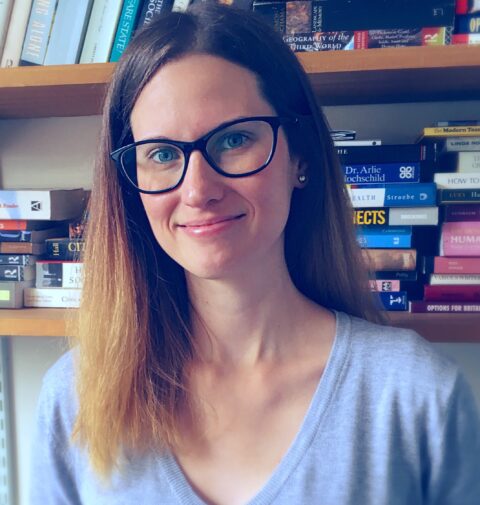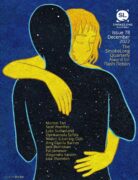I was enamored with this story from its delightfully long title, which speaks to the surrealism of the violent world depicted. Such real, widespread violence can feel surreal when lived. Why did you decide not to specify the setting beyond “Somewhere in Eastern Europe?”
I worked hard on the title. Stirred up a lot of emotions. On the one hand, it suggests a sense of being lost and maybe even being overlooked. On the other hand, the story was inspired by the horrors in Ukraine—Hungary’s neighbor, which is my birth country. (These horrors have been going on for years—Slava Ukraini!). But I also wanted to express something that’s rooted in the whole region, something the narrator’s mother expresses as Running is part of living here, dear. It’s difficult to put a well-developed narrative on this, but there’s a constant presence of direct, or indirect, internal, or external oppression rippling through borders and generations, eating through people’s lives like hydrochloric acid. I think of families, relatives, and friends, uprooted by (or living through) wars, economic devastation, or political repression. The dread of the knowledge that the world around you might collapse at any minute. In this traumatic instability, you have no other choice but to think in terms of survival. This experience unites Eastern Europe, a vast and diverse region. That’s what I was aiming to capture with the title.
I love how the breathless quality of the prose mirrors the characters’ running, as each paragraph is composed of one run-on sentence. Did you have this form in mind when you began writing, and how difficult did you find it to sustain?
This all came from an emotional shift inspired by Julia Strayer’s “Let’s Say.” And from admiring authors who are excellent at writing breathless prose. So, it wasn’t a completely rational decision, but when it happened, I did think this was the way to go. Editing was rational, though. I kept reading each paragraph aloud and smoothed the bits where the words tripped over themselves.
The implied dialogue between the protagonist and their daughter shatters me, especially once the daughter realizes they’re not running from elephants—a fantastic lie fabricated to protect her. I wonder how much she ever believed it. Was it difficult to write this moment of realization for the daughter—do children understand more than we credit them for?
I think children are definitely more in tune with their bodies and emotions, which we, as adults, learn to ignore or even see them as a burden. Deep down, the daughter also feels something isn’t right. At first, I wrote this story from her POV. The child’s voice is a recurring theme for me, I noticed, so I did this without really thinking about it. The story itself didn’t come together that way, but I got to know her very well. There’s a moment in every child’s life when they realize their parents are vulnerable humans too. I clearly remember my moment. For the daughter, this moment came devastatingly early. And I wanted to show that.
Your website states you’re currently writing a novel. Would you like to talk about that project, and maybe discuss how the challenges of writing long-form prose differ from those of flash fiction?
Oh, yes, the “long story” I only started calling a “novel” when I finished the shitty-first-draft (Anne Lamott’s magical term) of eighty thousand words last year. I’ve been avoiding it since by writing flash fiction (which I also love). For me, flash fiction is the thrill of a sprint, where you can clearly see the finish line, which gives you another push. With a novel, it’s hard to see the finish line, so you have to find another “reward.” And that reward is words on the page. And you really have to train yourself to not look at those words. They’re there and that’s what matters. A writer friend was also crucial for me, who kept me on track. I needed that because novel-writing is a massive training for your brain to be less judgmental and more accepting. More loving, even. This is also important for flash fiction. For life, really. But in the end, it doesn’t really matter if it’s a sprint or a marathon. It’s still running. You just have to pace and reward yourself differently. It’s still running. It’s still writing. You love writing, don’t you?



 The SmokeLong Grand Micro Contest (The Mikey) is now an annual competition celebrating and compensating the best micro fiction and nonfiction online.
The SmokeLong Grand Micro Contest (The Mikey) is now an annual competition celebrating and compensating the best micro fiction and nonfiction online.